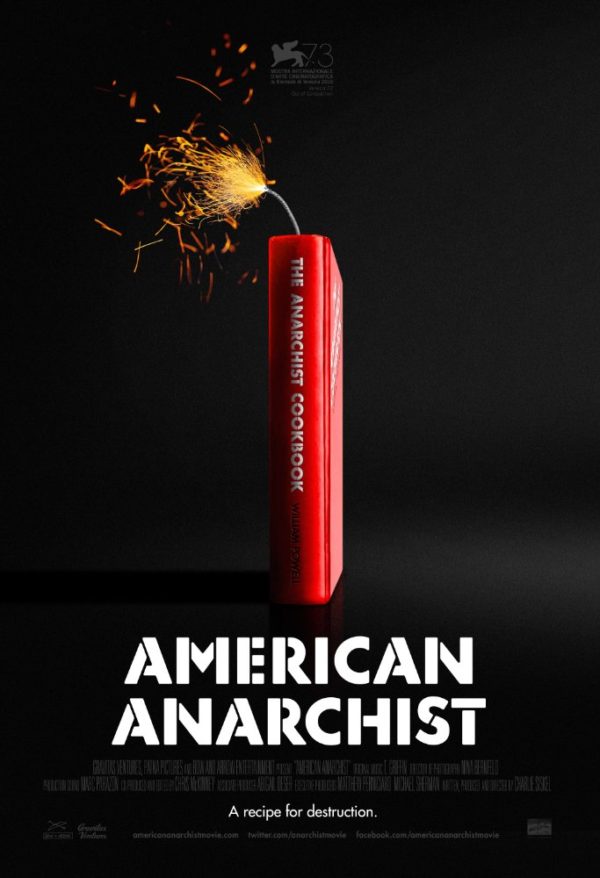American Anarchist (2016)
“I am happiest where I do not belong, where I am an outsider looking in.” William Powell, who wrote The Anarchist Cookbook in 1969 at age 19, reflects on his life in this lengthy documentary which seems almost like a therapy session trying to make him take responsibility for his words.
While many of us have doubts that publishing information about how to construct weapons of warfare is in any way a bad thing, The Anarchist Cookbook is more than a list of recipes. It is also a screed against the government, society and humanity in general. It is only fitting that its author was a complete outsider.
Director Charlie Siskel (nephew of Gene Siskel of movie review fame) takes us through the prerequisites for alienation: a Western European father who married a Southern European woman, life in England until a sudden move brought him back to the states, an unsteady relationship with his family and finally, a world coming apart in the late 1960s. He refers to it as an apocalyptic time.
The uncontroversial facts come out through interviews, family pictures and films, and montages of the era. A troubled but wealthy child who had been expelled from his private school for marijuana and vodka consumption, Powell moved to New York in his teens, got a job at a bookstore known for selling controversial works, then went into the massive New York Public Library at night to research what would become The Anarchist Cookbook. He cobbled together military manuals and previous works on subversion and sabotage into a giant list of everything one might need to overthrow the government, as he encourages people to do in the book.
Siskel probes Powell repeatedly on variations of the question with which the movie begins, which is essentially whether he feels culpability. Powell offers an interesting response. Although he claims the agency was with others, he expresses remorse for writing the book and what it has caused, but not regret. Indeed, we get the impression that he would do it again if he could.
What comes out in his words is that Powell is not so different from the people, like the Columbine shooters, who used his book: he wanted revenge on the world, and once he had sent the book into the world, he wanted a normal life with no responsibility to the rest of society except what he got paid for with his educational NGO.
The portrait that comes across in the documentary is of a man who has no connection to his world. Having married an Asian wife, he moved away from the United States and claimed to be uncomfortable there, living instead in rural France when not in Africa or Asia with his organization. (Powell died in 2016, about a month after the film finished shooting, although his voice in it is comprised of interviews done during a single week in 2015.)
Although not a sociopath, he seems detached, but likeable for his ready wit and insight. After all, this is the man who invented the term cuck when he wrote: “There is no place for emotionally or politically cuckolded people in the society I speak of. Survival of the fittest.”
If you think that makes him potentially a right-winger, he addressed that as well: “There is no justice left in the system. The only real justice is that which the individual creates for himself, and the individual is helpless without a gun. This may sound like the dogma expounded by radical right-wing groups, like the Minute Men. It is.” Elsewhere he opines: “Allow your love of freedom to overcome the false values placed on human life. For the only method to communicate with the enemy is to speak on his own level, using his own terms. Freedom is based on respect, and respect is earned by the spilling of blood.”
In interviews subsequent to the publication of the book, but not in the movie, he identified a fear of the draft and the war in Vietnam as a motivating force at the time he wrote the book. His Leftist credentials are solid however: like too many conservatives, he speaks in French Revolution language about the importance of freedom and the individual choosing what is true for himself.
American Anarchist, tightly edited and with an unobtrusive but powerful soundtrack, looks deep into William Powell and pulls away an image of a man who was more like the society he detested than he wanted to admit. Detached, morally neutral — it seems as if he wrote the book to be a hit because it was what the times called for — and seemingly completely unaware of himself, he resembles the loose cannon of the book itself.
While this movie references the events of forty-five years ago, it also brings up timely reminders. Sociopaths stalk the streets, the youth are (still, tediously) restless, and it seems like the world is heading to the end. Indirectly, American Anarchist offers us a moral parable of the accountability we face for our actions, even if only sentimentally and much removed from the events they help trigger.
Tags: anarchy, charlie siskel, cuckold, gene siskel, the anarchist cookbook, violence, william powell










